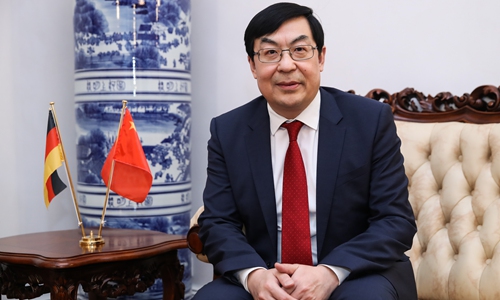China will not ‘sit idle’ if Huawei is excluded from Germany’s 5G rollout: official

Wang Weidong, commercial counselor of the Chinese Embassy in Germany. Photo: Courtesy of Chinese Embassy in Germany
If Germany passes laws that bar Huawei from participating in local 5G construction without showing solid evidence, China will not "sit idle," a Chinese official told the Global Times, noting that companies from the European nation have reaped massive benefits from the Chinese market .Facing pressure from the US, Germany's politicians are now divided on whether to exclude Huawei from its 5G rollout, citing security concerns. The German government reportedly delayed a decision on Germany's 5G rollout that may ban the Chinese tech company until 2020. Some media reports hint that the decision may be announced in January.
Wang Weidong, commercial counselor of the Chinese Embassy in Germany, told the Global Times in an exclusive interview that it is a "discriminative and unjust" decision against Chinese companies if Huawei is banned in Germany.
"Germany's firms have been operating in China and participating in the construction of local industries for years, and benefiting a lot from the Chinese market. If Huawei is excluded, it will release both a wrong signal of protectionism and a negative message to Sino-German economic cooperation and even cause a setback to bilateral relations," Wang warned.
Such a wrong decision will also take an "immensurable" toll on local consumers, telecom operators and German economy, according to the commercial counselor.
"The local telecom operators will pay extra time and costs for the 5G rollout. The time for 80 million consumers in Germany to receive 5G signals will be delayed. More importantly, Germany may miss the opportunity to take a ride on digital transformation due to weak digital infrastructure," Wang noted.
In October, Germany's mobile network provider Telefonica Deutschland announced that it plans to use Huawei equipment in its 5G network. It called Huawei a "proven strategic partner" on 5G infrastructure. But the decision is reportedly still awaiting a go-ahead from the German government.
Wang said that the discussion in Germany over Huawei is "politicizing" internet security issues.
"We strongly oppose blending politics and ideology with economic activities…As one of the countries that benefit the most from economic globalization, Germany should set an example in opening up and global cooperation, which is also the principle that Germany has followed for decades," Wang noted. He urged Berlin to provide a level playing field and indiscriminative environment for all foreign companies, including Chinese ones.
In fact, the telecommunication industry is a highly globalized one, where Chinese firms have contributed a lot of research and development in Europe and vice versa. "Only fair competition could lead to technological progress," Wang noted.
Over the past months, Washington has repeatedly piled up pressure on Berlin, saying it would limit the intelligence it shares with Germany's security agencies if Berlin did not shut out Huawei. The US claimed that Huawei's equipment install "backdoor" programs that enable the Chinese government to spy on other countries.
"May I kindly warn of the one who spied on Germany using the PRISM monitoring program?" Wang asked. "If Huawei really poses a threat to Germany's network security, then why was there no such example in 2G, 3G and 4G networks? And why are the so-called national security concerns being hyped when 5G network it beginning its rollout?"
In response to safety concerns, Huawei said last year that it would be willing to sign a "no-spy agreement" with the US to assuage security concerns.
Wang said that there are no laws in China that ask companies to gather a foreign country's information, and the Chinese government has not and will never ask Chinese firms to install backdoors to access data from any foreign nation.
"The national security claim is just an excuse for the US' bullying tactics on Huawei," Wang noted.




